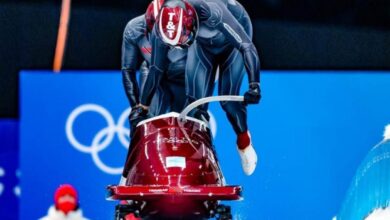The Mask That Adapts To Exercise And Pollution Using Artificial Intelligence
Researchers developed a mask that adapts to exercise by changing the size of its pores

A dynamic respirator changes the size of its pores in response to changing conditions, making it easier for the user to breathe; Transparent tubes connect the mask to a portable device that communicates with a computer. Photo: Adapted from ACS Nano 2021, DOI: 10.1021 / acsnano.1c06204
LatinAmerican Post| Juan Manuel Londoño
Listen to this article
Leer en español: El tapabocas que se adapta al ejercicio y a la polución usando inteligencia artificial
COVID-19 has created several difficulties for athletes, both professionals and those who just want to exercise. Team sports have become an impossibility for many, but perhaps the greatest discomfort for athletes is having to wear face masks outdoors.
As we know, wearing a mask is essential to prevent the transmission of the virus, but it can be uncomfortable when we are sweating and hyperventilating. It can give us a feeling of heat, humidity, and "bad breath" that is difficult to overcome. Many people even claim that they "can't breathe" when they exercise with masks.
This situation has led to several myths, such as that wearing a mask during exercise prevents the circulation of oxygen in the body. According to a study in the International Journal of Environmental Research and Public Health, this couldn't be further from the truth. "Our findings indicate that people can wear face masks during intense exercise without detrimental effects on performance and with minimal impact on oxygenation of the blood and muscles," they stated. However, due to the discomfort of wearing masks, their unpopularity among athletes persists.
That's why members of the American Chemical Society developed a mask that can modulate the size of your pores in response to changing conditions, such as exercise or pollution. The mask has a dynamic air filter with micropores that expand when the filter is stretched, allowing more air to pass through.
According to the researchers: "A large increase was achieved in the breathability of the filter, which was made of electrospun nanofibers, with only a loss of approximately 6% filtration efficiency."
You can also read: Gallery: Anti-Vaxxer Athletes who Changed their Minds
The most interesting thing about it is that the mask uses artificial intelligence to work. "The device communicates wirelessly with an external computer running artificial intelligence (AI) software that reacts to airborne particles, as well as changes in the user's breathing patterns during exercise," say the researchers.
In tests, the device worked correctly. As it was supposed to be, it generated less pore enlargement when used in polluted air than when used outdoors. It was also adapted to the respiratory characteristics of each person who wears it, something the researchers hope to be able to use in the future to create custom masks.
This research is of great importance, even in a future without COVID-19, as air pollution in cities is a problem that affects us all. Countries with populations of millions of people such as India and China have particulate matter indicators that are classified as "Unhealthy" by the World Health Organization. The use of face masks that are not uncomfortable and that adapt to various conditions will be essential in the future.




